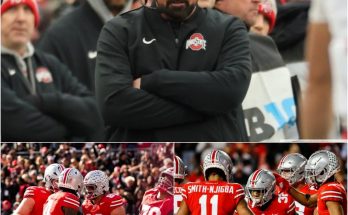From Road Kill to Ruthless: Alabama’s Stunning Rise to the Top of the SEC Leaves College Football Stunned
There are comeback stories in college football, and then there’s what Alabama has done this season — a transformation so dramatic, so improbable, that it feels like a script even Hollywood might’ve rejected for being too far-fetched. Just weeks ago, the Crimson Tide looked like a broken dynasty, a fallen empire gasping for relevance after being embarrassed on national television. Critics declared Nick Saban’s dynasty dead. The Tide, they said, had finally rolled out. But fast forward to today, and Alabama isn’t just winning again — it’s dominating, suffocating opponents with an intensity that reminds everyone what made this program the gold standard of college football in the first place.
From the ashes of early-season chaos, Alabama has risen like a storm. The same team that looked lifeless and lost against Texas in Week 1 has now become a disciplined, ferocious, and downright terrifying force. The offensive line that was bullied early on now opens gaping lanes. The defense that was confused and tentative is now snarling and unrelenting. And the quarterback once considered unfit to carry the weight of the Alabama legacy has become the heartbeat of this resurgence.
This rebirth didn’t happen overnight. It wasn’t a product of luck, a single play, or a fluke turnaround. It was the result of something deeper — a recalibration of identity, an embrace of humility, and a recommitment to the standard that Nick Saban has built his entire empire on. The story of Alabama’s rise from “road kill” to ruthless isn’t just about football. It’s about culture, accountability, and the kind of pride that refuses to let a program built on excellence crumble under pressure.
When Alabama fell early, the vultures circled fast. Analysts lined up to deliver their eulogies. The dynasty was over, they said. Georgia had replaced them atop the SEC throne. LSU was more dynamic. Ole Miss was more creative. Even Florida, they argued, might’ve been more cohesive. Alabama was yesterday’s story, an aging legend fading into the background as the new generation took over. Social media was merciless, replaying highlight after highlight of the Texas defense swarming Alabama’s backfield, mocking the Tide’s once-proud offensive line. “Road kill,” one columnist called them — a team flattened by the weight of their own past success.
But inside the walls of the Mal Moore Athletic Facility in Tuscaloosa, the noise never mattered. The external chaos only seemed to harden them. Players spoke later about how the loss forced them to look in the mirror — not at the opponent, not at the playbook, but at themselves. They realized they weren’t playing Alabama football. They weren’t representing the standard that has defined the program for nearly two decades. That realization was the turning point.
Nick Saban, the architect of modern college football dominance, didn’t panic. He didn’t overhaul the system or bench half the team. Instead, he went back to the fundamentals that have always defined Alabama’s identity — discipline, execution, and relentless effort. He challenged his players to take ownership, to “be the man,” as he often says. And slowly, methodically, the Tide began to turn.
The quarterback position, which had been the biggest source of doubt, became the engine of their revival. Jalen Milroe, once written off as inconsistent and error-prone, has transformed into one of the most composed and dangerous quarterbacks in the SEC. His decision-making sharpened. His confidence grew. The flashes of brilliance that appeared in short bursts early in the season became full games of controlled dominance. Milroe’s deep-ball accuracy and fearless running ability now tear defenses apart. Where once there was hesitation, now there is poise. He is no longer just playing quarterback — he’s commanding Alabama football.
Behind him, a rebuilt offensive line has emerged as a fortress. After being bullied early, the line found its rhythm, blending aggression with discipline. They’ve become the silent foundation of Alabama’s success, paving the way for a rejuvenated running attack that controls games and dictates tempo. Running backs who once struggled to find open lanes are now thriving, bursting through defenses with authority and confidence.
Defensively, Alabama’s transformation might be even more stunning. Early in the season, the Tide defense looked disorganized — missed assignments, blown coverages, and a lack of cohesion. Opposing quarterbacks exploited holes that shouldn’t have existed. But now, that same defense looks like something out of the Saban dynasty’s golden years — suffocating, relentless, and utterly unforgiving. The secondary has become a nightmare for opposing passers, with cornerbacks blanketing receivers and safeties closing gaps with surgical precision. The front seven, once hesitant, now attacks with a ferocity that breaks opponents mentally before the scoreboard even reflects it.
What’s changed isn’t just tactics — it’s attitude. You can see it in the way Alabama’s players carry themselves now. The sideline energy is different. The swagger is back, but it’s not arrogance; it’s confidence built on preparation. They celebrate big plays, but they also hold each other accountable when mistakes happen. This version of Alabama feels connected, unified, and hungry — a dangerous combination that no opponent wants to face in November football.
And the results speak for themselves. Game by game, the Tide have dismantled teams that once thought they could exploit Alabama’s supposed “decline.” SEC rivals that sensed blood in the water early in the season are now retreating. What’s most striking is not just that Alabama is winning, but how they’re doing it — dominating the line of scrimmage, controlling the tempo, and suffocating teams until there’s nothing left.
When Alabama beat a ranked LSU squad in a statement game, it wasn’t just a win. It was a declaration. The Tide had returned, and they were here to reclaim the throne. Every snap, every drive, felt like a message to the rest of the college football world: the dynasty is not dead. It was just reloading.
In the broader landscape of college football, Alabama’s resurgence has sent shockwaves. Programs that had built their recruiting pitches around the idea that the Tide’s reign was over now find themselves scrambling to adjust. Georgia, the reigning power, suddenly has company again atop the SEC hierarchy. Analysts who were ready to write Saban off are now rewriting their narratives. The old master has adapted once again, proving that in the ever-evolving chess match of college football, he remains several moves ahead.
And perhaps that’s the most remarkable part of this entire turnaround — the adaptability of Nick Saban. At 73, he’s not just managing another season; he’s reinventing himself yet again. He’s balanced the toughness that built Alabama’s culture with the modern realities of college football — NIL, transfer portals, and player empowerment. While other veteran coaches have struggled to navigate this new landscape, Saban has embraced it, molding it to fit his standard rather than letting it define him.
The emotional core of this team has also changed. Veterans have stepped up, guiding younger players through adversity. Leaders like Dallas Turner on defense and Milroe on offense have become the emotional anchors of the squad. The locker room isn’t fractured by ego or frustration — it’s unified by purpose. They’ve rediscovered what it means to wear that crimson jersey, to carry the weight of a program that demands excellence every single day.
As Alabama’s season barrels toward its climax, the question isn’t whether the Tide are back — it’s whether anyone can stop them. The SEC, once viewed as wide open, suddenly looks familiar again. Alabama isn’t just winning games; it’s controlling narratives. The road to Atlanta and the College Football Playoff once again runs through Tuscaloosa.
This resurgence is more than a football story — it’s a study in resilience. It’s a reminder that even in an age of instant gratification, real greatness still requires patience, humility, and relentless self-belief. Alabama could have crumbled under the weight of early criticism. They could have made excuses or panicked under pressure. Instead, they dug deeper. They chose to respond rather than react.
Every great dynasty faces moments of reckoning — those times when the world believes the empire has fallen. For Alabama, that moment came early this season. But what separates the good from the great, the pretenders from the true legends, is how they respond when everyone else counts them out. Alabama responded with fury, focus, and faith in their process.
Now, as they march toward the postseason, they’re not just playing for wins. They’re playing for legacy. They’re playing to remind the world that Alabama football is not defined by a single season, a single loss, or a single criticism. It’s defined by a relentless pursuit of excellence — the kind that doesn’t waver, doesn’t flinch, and doesn’t fade with time.
From road kill to ruthless, the Crimson Tide’s journey has been nothing short of breathtaking. What began as a season of doubt has turned into one of the most compelling redemption arcs in college football history. The SEC, and the entire nation, is once again bowing to the familiar sound of dominance — the echo of “Roll Tide” reverberating across stadiums, a battle cry from a program that refuses to die quietly.
For Nick Saban and Alabama, the message is simple: the standard never left. It was merely waiting for the team to rediscover it. And now that they have, the rest of college football might want to brace itself. The Tide aren’t just back. They’re ruthless again — and that’s the scariest sight in all of sports.



